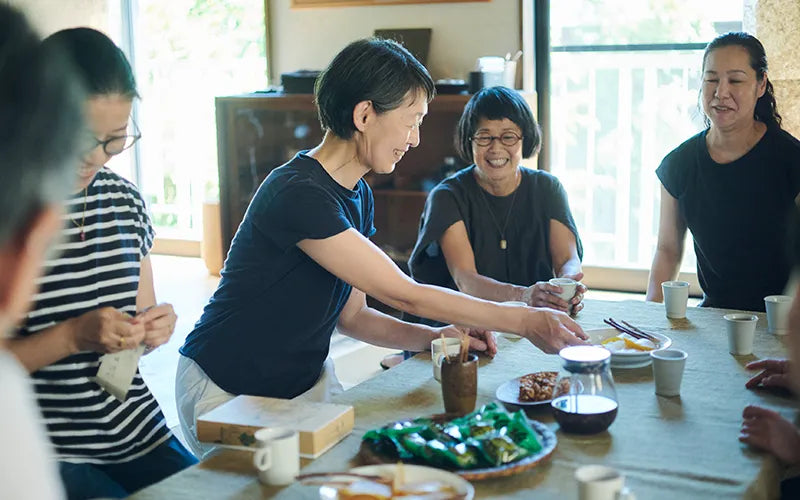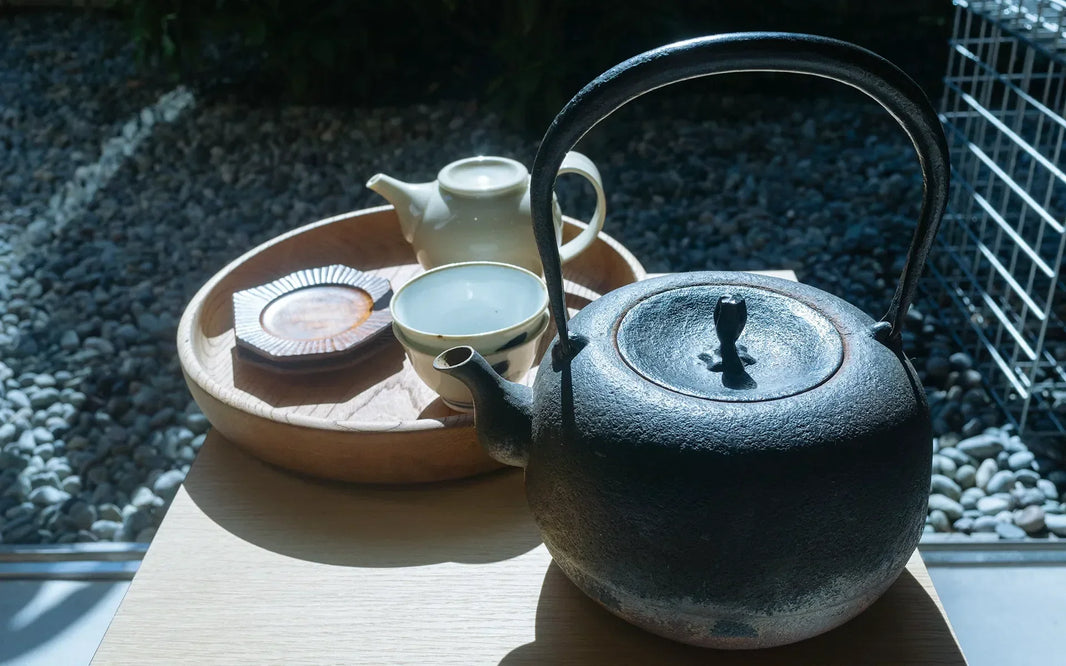"Shall we have some tea?" What do we truly mean when we extend this invitation?
It's about more than quenching one's thirst. It's about sharing time with someone, listening to our own honest inner voice. It's about pausing our hectic daily lives to exchange words—a time for connection.
How do people spend their tea time? We've glimpsed into the tea moments of three different groups.
In this article, we introduce the tea time of Tsuchiya Mieko, representative of "Tsuchiya Textile Studio," who creates hand-spun, hand-woven fabrics primarily using cotton.
Tsuchiya:
My mother always wore kimono, so I'd accompany her to kimono shops—fabric was part of my life from an early age. Before I knew it, I'd fallen in love with textiles. When I turned 20 and began thinking about how I wanted to live my life, I decided I wanted to create things with fabric as my medium. That's how I started down this path.
Initially, I focused on silk—purchasing threads, dyeing them myself, combining them with other natural materials, and weaving items like stoles. However, as times changed, fewer and fewer people were making the kind of thread that captured my heart. I realized that while thread was the most important element in what I created, I couldn't keep depending on others for it. That's what led me to begin making fabric from thread I spun myself.
Later, when I moved to Nara, I made cotton—which has been cultivated extensively in this region since ancient times—the primary material for my work.


There was another reason, too—I'd been feeling a sense of unease about society even back then. The world was becoming more prosperous, yet I felt we were losing something precious. It's not that everything old is necessarily good, but I found it unfortunate that we were moving further and further away from the beautiful way of life that Japanese people once lived.
But complaining doesn't accomplish anything, so I thought perhaps what I could do for the world was to increase the number of people who create things with their own hands, and to find resonance with those who share this sentiment.
Hand-spun thread—a traditional method of making things—cannot be mass-produced or mass-marketed. I understand why it's being abandoned from an economic perspective, but it's still a shame to see it disappear. There's a unique strength and appeal that emerges from creating with limited materials close at hand, and it's simply such a pleasant activity that I believed there must be people who would want to do it.
Against this backdrop, through Tsuchiya Textile Studio, I create crafted living essentials from hand-spun, hand-woven fabric. About 12 years ago, I also began leading the "Cotton Hand-Spinning Circle." And I myself continue to study the history of textiles, their social context, and the journey of cotton in Nara, striving to share this knowledge with others.

(The Spinning Wheel by a Nara Craftsperson, Essential for Making Hand-Spun Thread)
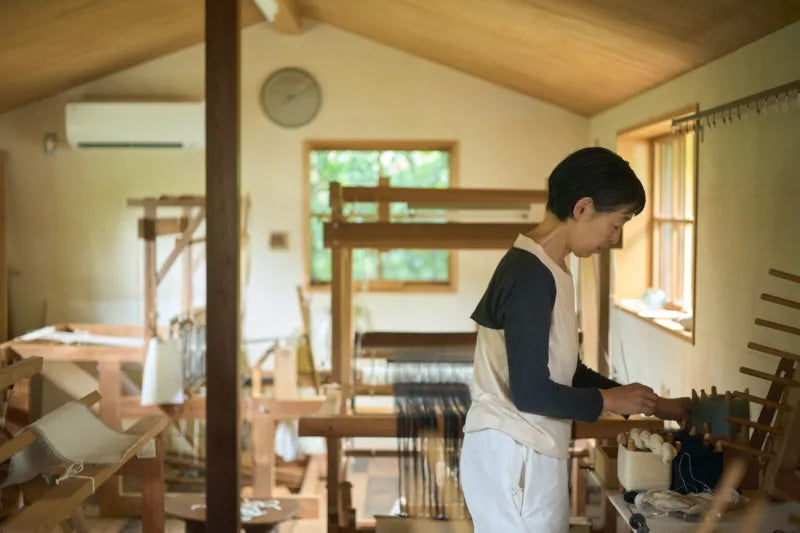
The "Cotton Hand-Spinning Circle" has about 30 participants in total—those learning to spin thread and those learning to weave—and everyone experiences the entire process, starting from cultivating cotton plants. We have a field about a seven-minute walk from the workshop, where we plant seeds, clear weeds, and grow cotton using natural farming methods.
Some people find tremendous joy in weaving fabric from thread they've spun with their own hands, and witnessing this sometimes gives me moments of profound realization myself.
Hand-spun, hand-woven fabric that can only be created through time and effort may be difficult to price in today's world, but I want to create and use fabric where I can feel life flowing through it, and continue making things I'm truly satisfied with. Even if it's challenging as a commercial product, why not try making it yourself? That's what I suggest. Delivering this message is also part of the work of textile-making, and I hope to connect with people through creating fabric in this way.

(We Clear the Weeds in the Cotton Field Ourselves)

(Tea with Everyone Between Field Work: A Time When Hearts Unwind)
During breaks at the spinning circle, we drink tea while chatting together. The act of making tea itself can be enjoyable and relaxing, can't it? That's why I leave the tea-making to everyone.
The topics during break time vary widely, and I mostly find myself listening. Tea isn't just about the drinking itself—it serves as an intermediary when spending time with others, doesn't it?
It's the same when I occasionally have tea with workshop staff after work. With a somewhat relaxed feeling, I might casually pose questions about things I'm pondering, or seemingly trivial conversations can lead to sharing each other's feelings. Even without a special theme, the very act of spending time together—I think that's the meaning of tea time.
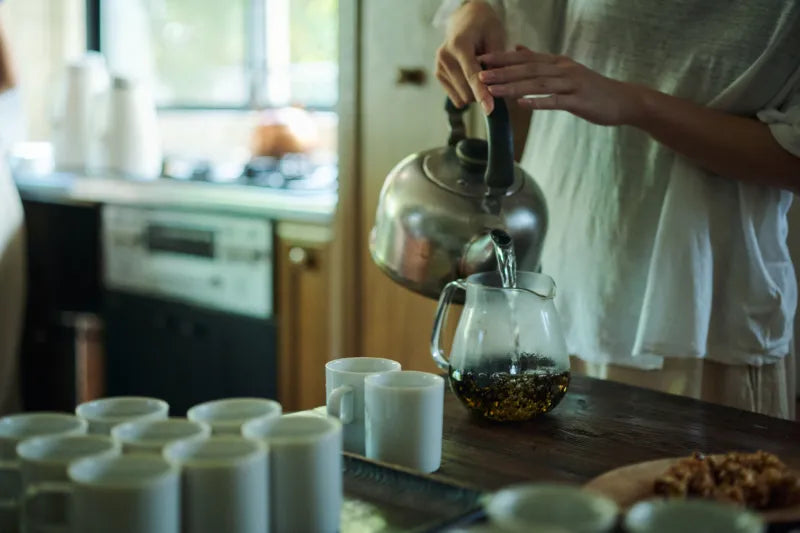
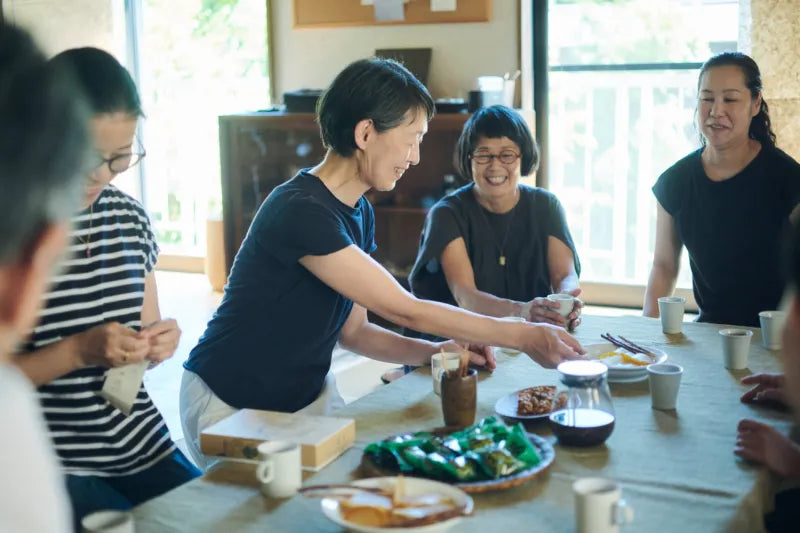
Tsuchiya Mieko, Tsuchiya Textile Studio
Her workshop is located near the Heijō Palace ruins in Nara City, where she creates hand-spun, hand-woven fabrics in a verdant setting. Through the "Cotton Hand-Spinning Circle" that she leads, participants engage in the entire process—from cultivating cotton in a field near the workshop to spinning thread and weaving fabric—sharing each step of the journey together.


